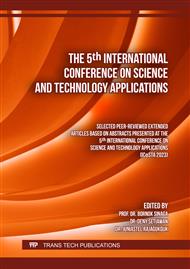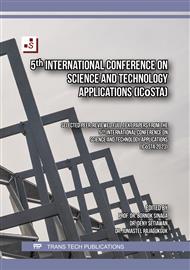[1]
S. Tarafder, S. Sivaprasad, V.R. Ranganath, Comparative assessment of fatigue and fracture behaviour of cast and forged railway wheels, Fatigue Fract. Eng. Mater. Struct. 30 (2007) 863-876.
DOI: 10.1111/j.1460-2695.2007.01158.x
Google Scholar
[2]
M.E. Getmanova, D.S. Ilyukhin, A.N. Nikulin, G.A. Filippov, Composition and properties of steel in cast and forged railroad wheels, Steel Transl. 47 (2017) 70-77.
DOI: 10.3103/s0967091217010065
Google Scholar
[3]
M. Hawryluk, Ł. Dudkiewicz, J. Ziemba, S. Polak, P. Kaczyński, T. Szymańska, Problems of the process of manufacturing precision forgings in multiple systems on a hot hydraulic hammer, J. Manuf. Process. 96 (2023) 54-67.
DOI: 10.1016/j.jmapro.2023.03.083
Google Scholar
[4]
J. Song, L. Shi, H. Ding, R. Galas, M. Omasta, W. Wang, J. Guo, Q. Liu, M. Hartl, Effects of solid friction modifier on friction and rolling contact fatigue damage of wheel-rail surfaces, Friction 10 (2022) 597-607.
DOI: 10.1007/s40544-021-0521-5
Google Scholar
[5]
A. Myśliński, A. Chudzikiewicz, Wear modelling in wheel–rail contact problems based on energy dissipation, Tribol. - Mater. Surf. Interfaces 15 (2021) 138-149.
DOI: 10.1080/17515831.2020.1829880
Google Scholar
[6]
Y. Zhu, U. Olofsson, H. Chen, Friction between wheel and rail: a pin-on-disc study of environmental conditions and iron oxides, Tribol. Lett. 52 (2013) 327-339.
DOI: 10.1007/s11249-013-0220-0
Google Scholar
[7]
N. Jin, P. Clayton, Effect of microstructure on rolling/sliding wear of low carbon bainitic steels, Wear 202 (1997) 202-207.
DOI: 10.1016/s0043-1648(96)07271-7
Google Scholar
[8]
R. Devanathan, P. Clayton, Rolling-sliding wear behavior of three bainitic steels, Wear 151 (1991) 255-267.
DOI: 10.1016/0043-1648(91)90253-q
Google Scholar
[9]
S.N. Lingamanaik, B.K. Chen, Thermo-mechanical modelling of residual stresses induced by martensitic phase transformation and cooling during quenching of railway wheels, J. Mater. Process. Technol. 211 (2011) 1547-1552.
DOI: 10.1016/j.jmatprotec.2011.04.007
Google Scholar
[10]
J. Georgiev, T. Pieczonka, M. Stoytchev, D. Teodosiev, Wear resistance improvement of sintered structural parts by C7H7 surface carburizing, Surf. Coat. Tech. 180-181 (2004) 90–96.
DOI: 10.1016/j.surfcoat.2003.10.024
Google Scholar
[11]
M. Izciler, M. Tabur, Abrasive wear behavior of different case depth gas carburized AISI 8620 gear steel, Wear 260 (2006) 90-98.
DOI: 10.1016/j.wear.2004.12.034
Google Scholar
[12]
M.B. Karamiş, R. Ipek, An evaluation of the using possibilities of the carbonitrided simple steels instead of carburized low alloy steels (wear properties), Appl. Surf. Sci. 119(1997)25-33.
DOI: 10.1016/s0169-4332(97)00173-6
Google Scholar
[13]
B. Selçuk, R. Ipek, M.B. Karamiş, A study on friction and wear behaviour of carburized, carbonitrided and borided AISI 1020 and 5115 steels, J. Mater. Process. Technol. 141 (2003) 189-196.
DOI: 10.1016/s0924-0136(02)01038-5
Google Scholar
[14]
A. Alsaran, F. Yildiz, A. Celik, Effects of post-aging on wear and corrosion properties of nitrided AISI 4140 steel, Surf. Coat. Tech. 201 (2006) 3147-3154.
DOI: 10.1016/j.surfcoat.2006.06.033
Google Scholar
[15]
A. Alsaran, F. Yildiz, A. Celik, Effect of post-oxidizing on tribological and corrosion behaviour of plasma nitrided AISI 5140 steel, Surf. Coat. Tech. 176 (2004) 344-348.
DOI: 10.1016/s0257-8972(03)00770-9
Google Scholar
[16]
O. Furukimi, H. Katafuchi, M. Aramaki, M. Kozin, S. Oue, K. Yoshida, I. Narita, N. Yamada, M. Yamamoto, Wear resistance of industrial pure iron treated by nitriding and quenching followed by aging process, Mater. Trans. 57 (2016) 1587-1592.
DOI: 10.2320/matertrans.h-m2016825
Google Scholar
[17]
M. Aramaki, M. Kozin, K. Yoshida, O. Furukimi, Effects of nitriding-quenching and carburizing-quenching on wear properties of industrial pure iron, HTM J. Heat Treatm. Mat. 73 (2018) 131-143.
DOI: 10.3139/105.110346
Google Scholar
[18]
M. Kozin, K. Kusakabe, M. Aramaki, N. Yamada, S. Oue, Y. Ozaki, O. Furukimi, M. Tanaka, Effect of nitriding-quenching and carburizing-quenching processes on the wear resistance of the sintered pure iron, J. Jpn. Soc. Powder Powder Metall. 67 (2020) 173-181.
DOI: 10.2497/jjspm.67.173
Google Scholar
[19]
M.K. Lee, G.H. Kim, K.H. Kim, W.W. Kim, Control of surface hardnesses, hardening depths, and residual stresses of low carbon 12Cr steel by flame hardening, Surf. Coat. Technol. 184 (2004) 239-246.
DOI: 10.1016/j.surfcoat.2003.10.063
Google Scholar
[20]
M.K. Lee, G.H. Kim, K.H. Kim, W.W. Kim, Effects of the surface temperature and cooling rate on the residual stresses in a flame hardening of 12Cr steel, J. Mater. Process. Technol. 176 (2006) 140-145.
DOI: 10.1016/j.jmatprotec.2006.03.119
Google Scholar



